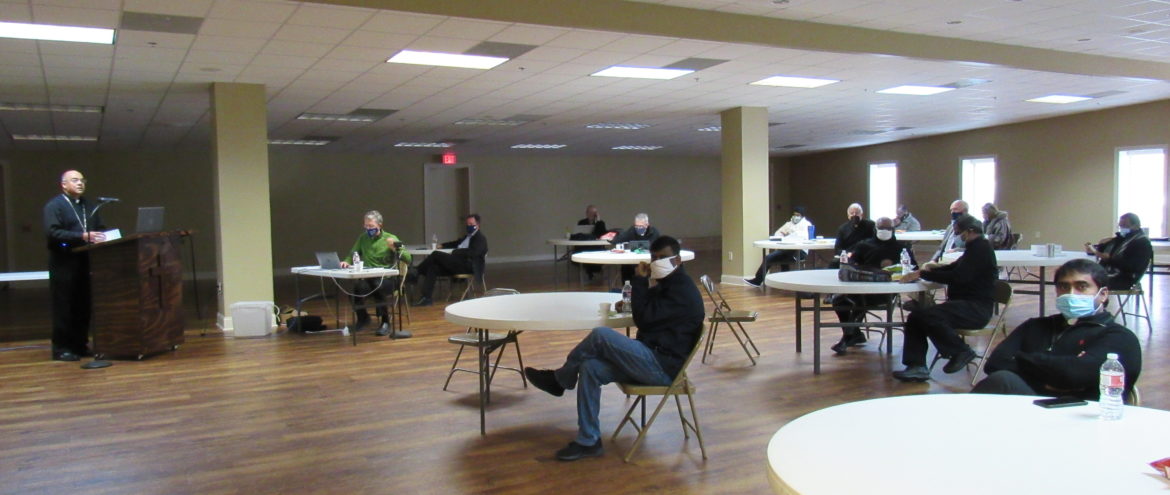By Fran Lavelle
JACKSON – Bishop Shelton Fabre of the Diocese of Houma-Thibodaux was invited to speak to the priests, deacons, and lay ecclesial ministers on the United States Conference of Catholic Bishops (USCCB) 2018 document, “Open Wide Our Hearts: The Enduring Call to Love.” He gave four presentations; first, he examined how the church responded to racism before Open Wide Our Hearts; he then gave an in-depth reflection into the document; he shared resources that can be used to engage conversation on the topic of racism; and he gave a final presentation on why the ministers of the church must preach on racism.
Bishop Fabre began his remarks noting that, “No one presentation, no one pastoral letter, no one day is going to capture the full tragic reality of racism. Racism is a multi-faceted, dynamic, ever adapting evil and sin that grips us. We are constantly trying to rise above it and dismantle it in our lives.”

However, he maintains that a good first step is understanding where we are today in context of racism and the church. To do that we need to look to the wisdom of the past. The church in the US has, in responding to and in seeking to root out racism, promulgated several pastoral letters to direct a more intentional understanding of the sinful nature of racism. Bishop Fabre made note that the social landscape of our nation today looks much like it did 60 years ago with a turbulent environment in race relations. Our call to holiness as the Body of Christ at work on earth requires us to respond in word and action.
The US Catholic Church first addressed the sin of racism in 1958 with the document, “Discrimination and Christian Conscience.” The document condemns the blatant forms of racism that were found in segregation and Jim Crow laws. A decade later, in 1968, “National Race Crisis” was written to condemn the indignity of racism and the policies that had led to violence that erupted in many major cities across our nation. The Bishops noted, “Evident that we did not do enough, we have much more to do. It became clear that we failed to change the attitude of many believers.”
The previous document did not accomplish what it intended. Within the Church the Black Catholic Clergy caucus made their first attempt to speak to the church from the perspective of the Black experience. The Black clergy called upon the church to recognize the increasing alienation and the estrangement taking place between the black community and the Catholic Church. “National Race Crisis” called for the faithful to act decisively. The proponents of the document took a broad view of racism to include attitudes and behaviors not just in hearts of men but also in their institutions. Institutional, structural racism was recognized along with individual personal racism.
Then in 1979 the Bishops issued, “Brothers and Sisters to Us,” as racism was still affecting so many. It highlighted the structural and institutional forms of racial injustice evident in the economic imbalances found in our nation. Together these three documents addressed race within the boarders of our own nation. They offer strong words of condemnation against racism. Just when it felt like we might be entering into a post racial America, we realized how evident it is that we are not.
In August 2017 after a white supremacist rally in Charlottesville, Virginia in which one person was left dead and many more injured after a self identified white supremacist deliberately ran his car into a crowd of counter-protesters, the Ad Hoc Committee Against Racism realized the Bishops must once again use their voice to address the sin of racism. The result of that work was the publication of “Open Wide Our Hearts: An Enduring Call to Love” in 2018.
The pastoral letter reminds the faithful that we are all brothers and sisters, made in the likeness and image of God. Bishop Fabre reminded us that laws are necessary to maintain civil society. However, only a conversion of heart, will root out the sin of racism in our own hearts and in our institutions.
Father “Clem” Oyafemi, newly assigned administrator of Holy Family Jackson and coordinator of intercultural ministries at the diocese, offered his takeaway from the workshop. “No one can listen to Bishop Fabre’s message on racism without having a conversion,” Father Clem said. “He challenges us preachers to have the courage to confront the evil of racism as it contradicts our identity as Christians. For me, “Open Wide Our Hearts” is like a mirror. There is enough curiosity to hold in front of me, and having seen the dirt on my face, there is the urgency to go wash it. That document makes me see why racism and Christianity are not compatible.”
Discerning how Catholics can be part of the solution is an overwhelming task, but “the journey of one thousand miles must begin with a single step.” (Lao Tzu) Thankfully the USCCB has produced a treasure trove of resource materials including a study guide for the pastoral letter, catechetical materials, and tips for preaching on racism. The resources can be found online at: https://www.usccb.org/racism.
There are some who would say that the church needs to stay out of social issues like racism and stick to preaching the Gospel. At that, Mark 12:30 reads, “You shall love the Lord your God with all your heart, with all your soul, with all your mind, and with all your strength. The second is this: ‘You shall love your neighbor as yourself.’ There is no other commandment greater than these.” That is the enduring call to love. That is the love that compels us as Catholics, to work to end racism.
(Fran Lavelle is the Director of Faith Formation for the Diocese of Jackson.)
